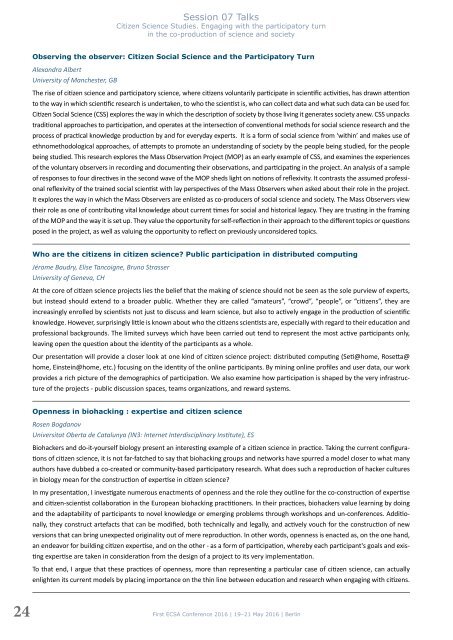Citizen Science –
book_of_abstracts_ecsa2016
book_of_abstracts_ecsa2016
You also want an ePaper? Increase the reach of your titles
YUMPU automatically turns print PDFs into web optimized ePapers that Google loves.
Session 07 Talks<br />
<strong>Citizen</strong> <strong>Science</strong> Studies. Engaging with the participatory turn<br />
in the co-production of science and society<br />
LAGEPLAN<br />
Observing the observer: <strong>Citizen</strong> Social <strong>Science</strong> and the Participatory Turn<br />
Alexandra Albert<br />
University of Manchester, GB<br />
The rise of citizen science and participatory science, where citizens voluntarily participate in scientific activities, has drawn attention<br />
to the way in which scientific research is undertaken, to who the scientist is, who can collect data and what such data can be used for.<br />
<strong>Citizen</strong> Social <strong>Science</strong> (CSS) explores the way in which the description of society by those living it generates society anew. CSS unpacks<br />
traditional approaches to participation, and operates at the intersection of conventional methods for social science research and the<br />
process of practical knowledge production by and for everyday experts. It is a form of social science from ‘within’ and makes use of<br />
ethnomethodological approaches, of attempts to promote an understanding of society by the people being studied, for the people<br />
being studied. This research explores the Mass Observation Project (MOP) as an early example of CSS, and examines the experiences<br />
of the voluntary observers in recording and documenting their observations, and participating in the project. An analysis of a sample<br />
of responses to four directives in the second wave of the MOP sheds light on notions of reflexivity. It contrasts the assumed professional<br />
reflexivity of the trained social scientist with lay perspectives of the Mass Observers when asked about their role in the project.<br />
It explores the way in which the Mass Observers are enlisted as co-producers of social science and society. The Mass Observers view<br />
their role as one of contributing vital knowledge about current times for social and historical legacy. They are trusting in the framing<br />
of the MOP and the way it is set up. They value the opportunity for self-reflection in their approach to the different topics or questions<br />
posed in the project, as well as valuing the opportunity to reflect on previously unconsidered topics.<br />
Who are the citizens in citizen science? Public participation in distributed computing<br />
Jérome Baudry, Elise Tancoigne, Bruno Strasser<br />
University of Geneva, CH<br />
At the core of citizen science projects lies the belief that the making of science should not be seen as the sole purview of experts,<br />
but instead should extend to a broader public. Whether they are called “amateurs”, “crowd”, “people”, or “citizens”, they are<br />
increasingly enrolled by scientists not just to discuss and learn science, but also to actively engage in the production of scientific<br />
knowledge. However, surprisingly little is known about who the citizens scientists are, especially with regard to their education and<br />
professional backgrounds. The limited surveys which have been carried out tend to represent the most active participants only,<br />
leaving open the question about the identity of the participants as a whole.<br />
Our presentation will provide a closer look at one kind of citizen science project: distributed computing (Seti@home, Rosetta@<br />
home, Einstein@home, etc.) focusing on the identity of the online participants. By mining online profiles and user data, our work<br />
provides a rich picture of the demographics of participation. We also examine how participation is shaped by the very infrastructure<br />
of the projects - public discussion spaces, teams organizations, and reward systems.<br />
Openness in biohacking : expertise and citizen science<br />
Rosen Bogdanov<br />
Universitat Oberta de Catalunya (IN3: Internet Interdisciplinary Institute), ES<br />
Biohackers and do-it-yourself biology present an interesting example of a citizen science in practice. Taking the current configurations<br />
of citizen science, it is not far-fatched to say that biohacking groups and networks have spurred a model closer to what many<br />
authors have dubbed a co-created or community-based participatory research. What does such a reproduction of hacker cultures<br />
in biology mean for the construction of expertise in citizen science?<br />
In my presentation, I investigate numerous enactments of openness and the role they outline for the co-construction of expertise<br />
and citizen-scientist collaboration in the European biohacking practitioners. In their practices, biohackers value learning by doing<br />
and the adaptability of participants to novel knowledge or emerging problems through workshops and un-conferences. Additionally,<br />
they construct artefacts that can be modified, both technically and legally, and actively vouch for the construction of new<br />
versions that can bring unexpected originality out of mere reproduction. In other words, openness is enacted as, on the one hand,<br />
an endeavor for building citizen expertise, and on the other - as a form of participation, whereby each participant's goals and existing<br />
expertise are taken in consideration from the design of a project to its very implementation.<br />
To that end, I argue that these practices of openness, more than representing a particular case of citizen science, can actually<br />
enlighten its current models by placing importance on the thin line between education and research when engaging with citizens.<br />
24<br />
First ECSA Conference 2016 | 19<strong>–</strong>21 May 2016 | Berlin


